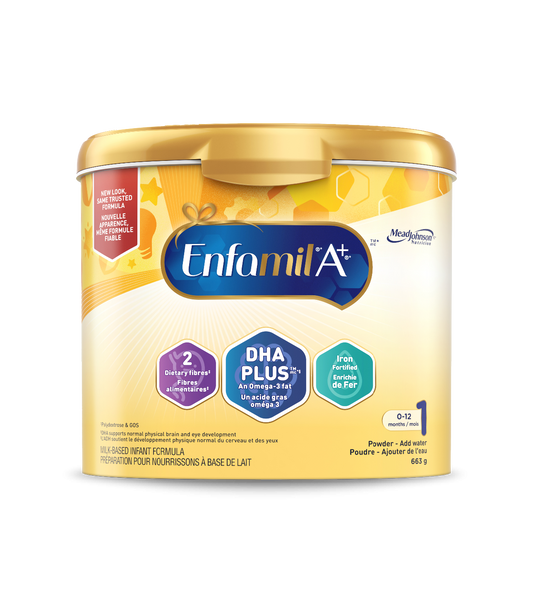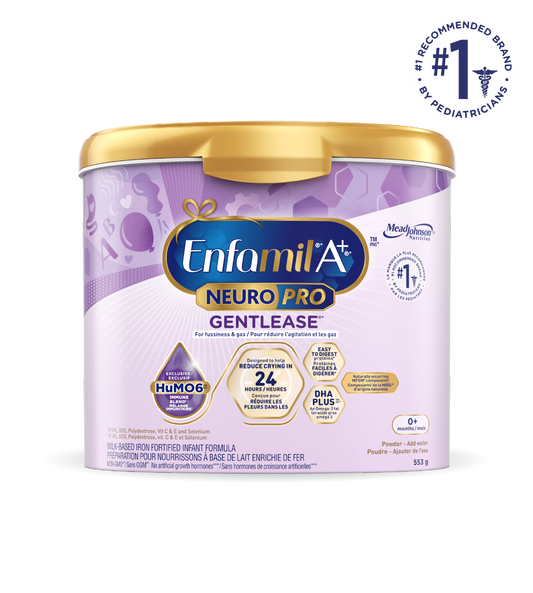Thinking about using formula or supplementing breast milk with formula, but nervous about how it will work for your baby? Here’s what you need to know to make the best decision for your family.
When it comes to breastfeeding and formula feeding, you know there are a lot of viewpoints out there. So how do you sort out what’s well-informed and what’s not? Start by checking out these facts, then talk with your doctor. No matter what feeding path you take, you’re more likely to feel good about it when it’s grounded in fact, not worry.

FACT:
One in three Moms feed their babies a combination of breast milk and formula
Did you know that almost one in three Moms feed their babies a combination of breast milk and formula at some point during the first three months?

FACT:
Supplementing with baby formula will likely not dry up your breast milk
It is unlikely that your breast milk supply will dry up if you supplement with baby formula.

FACT:
Another good way to provide complete nutrition for your baby is with baby formula.
Formula provides complete nutrition.

FACT:
Feeding time is one of the best times to bond with your baby
You can still bond with your baby if you formula feed.

FACT:
A good way to cope with feeding issues is with a pediatrician recommended formula.
Some doctors support formula-feeding.
Fact: Did you know that almost one in three Moms feed their babies a combination of breast milk and formula at some point during the first three months?
The Canadian Paediatric Society, Dietitians of Canada, Breastfeeding Committee for Canada, and Health Canada recommend exclusive breastfeeding for the first six months of life. Breastfeeding is the best nutrition option for babies. But, if you choose to supplement, you’re not alone. Every Mom and baby pair is unique and so is their situation and feeding decision. New Moms may choose to supplement breast milk with baby formula for many reasons—including to provide extra nutrition when necessary, to share feeding duties, and to facilitate returning to work.
Fact: It is unlikely that your breast milk supply will dry up if you supplement with baby formula.
It’s true that the more breast milk your baby drinks, the more your body produces. But adding some infant formula to your baby’s diet won’t make your milk disappear. When you swap some of what your baby consumes in breast milk with formula, your breasts adjust accordingly. You can first offer the breast and then “top off” with formula. Or you can switch out some nursing sessions for the bottle, such as at night or when you’re away. You can also use pumping as part of your supplementing plan.
Fact: Formula provides complete nutrition.
Today’s baby formulas are closer to breast milk than ever before. Formulas offer essential nutrients such as vitamin D, which breastfed babies may need to get from supplements. Like breast milk, formula can also have an important omega-3 fatty acid, DHA. That’s good to know, because DHA supports your baby’s rapidly developing brain.
Fact: You can still bond with your baby if you formula feed.
Feeding time is one of the best and most important times of connection. Even if you formula feed your baby, she still knows that she’s being held, loved, and nourished. So if supplementing or formula feeding lowers your stress level because you’re less worried about your baby’s growth or returning to work, that’s a plus for your ability to be responsive and loving to your baby. And when your partner or a grandparent offers a feeding, it strengthens that person’s turn at bonding too.
Fact: Some doctors support formula-feeding.
Doctors know that some issues can crop up to make exclusive breastfeeding difficult. These can include health problems in the mother (such as a difficult delivery or postpartum depression), challenges with milk production, and health problems in the baby (that make breastfeeding difficult or interfere with weight gain).
Whenever you’re having challenges with feeding, it’s always a good idea to talk to your health care provider. Baby-care experts have seen all kinds of situations, and ultimately, they share the same goal as you no matter how you get there—a happy, thriving baby. You and your health care provider will know what the best path is for you and your baby at the time. And that’s all that matters.









